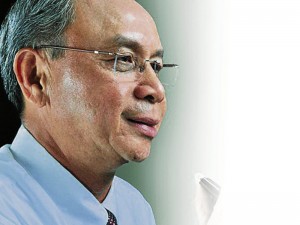Property developers are in for some rough sailing, as tough times threaten to loom.
Despite the robust growth it has been enjoying and the surging demand for office and residential space, the real estate industry is now caught “in the middle of a perfect storm,” posing huge challenges for its players, according to Manuel Crisostomo, national president of the Subdivision and Housing Developers Association.
Crisostomo explains that this “storm” came about as the state-controlled Home Development Mutual Fund (Pag-Ibig Fund) has begun implementing more stringent policies in granting housing loans, while the Land Registration Authority’s recent computerization program has resulted in a longer processing period.
Started to impose reforms
The problem, according to Crisostomo, started in the middle of last year, when Pag-Ibig started to impose reforms and policies that could help prevent a repeat of the Globe Asiatique fiasco.
“The Globe Asiatique problem was isolated to that particular developer but because of that problem, Pag-Ibig reacted in a way that affected many of our developer-members who follow the rules,” Crisostomo explains.
This then posed a major challenge for the group, as the new rules mostly affected SHDA members who are now into socialized and low-cost housing developments.
According to the group, the home loan policy changes resulted in a significant 40-percent decline in the number of loan takeouts that the agency has garnered from two years ago, as thousands of loan applications are now either being severely delayed or disqualified. The number of Pag-Ibig loan takeouts, SHDA says, has plunged by 37 percent to P2.4 billion per month this year, from P4 billion monthly in 2009.
“Most of our clients are overseas Filipino workers (OFWs) and the new procedures that require so many additional steps have made buyers become frustrated already,” Crisostomo says.
“The marginalized buyers are the most affected,” he adds, further explaining that 65 percent of the local housing financing is covered by Pag-Ibig while the remaining 35 percent by banking and financial institution.
Major blow
Meanwhile, the SHDA also considers as a major blow to the housing sector the recent computerization project of the Land Registration Authority.
The process, which was aimed toward the streamlining of business processes and linking all the Registries of Deeds nationwide, had ironically extended and prolonged transaction process from seven days to more than three months.
“Due to the computerization, there had been delays. The process led to a major slowdown,” Crisostomo says.
“This long and extended transaction time adds to the burden of every Filipino family wishing to finally enjoy having their own homes. Instead of being able to move in to their new homes immediately, these individuals have to pay their rent for their current homes, instead of paying the amortization for their own homes,” he explains.
Faced with such challenges, the SHDA now has taken on the task to communicate and reach out to the different government housing agencies to identify strategic measures that will help improve and increase the sector’s performance.
Work with gov’t
“What we are aiming here is to work hand in hand with the government for quicker and more efficient measures of addressing the country’s 3.7-million housing backlog,” Crisostomo says.
“We have communicated our concerns to Pag-Ibig and they have been very open. We discussed with them how this changes can be as painless as possible. We are asking Pag-Ibig to ease up and follow simpler rules. Also, we continue to have dialogues with the LRA and they have been very open and responsive, hopefully this would result to improving processing time,” he adds.
Collaboration
“It will be a public-private sector collaboration. We hope to be able to create a roadmap to address housing issues and needs in the Philippines. We are committed to perform our share in nation building,” Crisostomo says.
SHDA, with 235 members in Luzon, Visayas and Mindanao, is to date the largest and leading housing developer organization in the country. Its members range from big industry players to developers that offer affordable and low-cost housing.
And as the premier organization in the Philippine housing sector, SHDA believes it has an obligation to provide a home to every hardworking Filipino.
“We believe that the only way to achieve this goal is to come up with thorough and concise processes that promote responsible, sustainable and affordable housing developments,” Crisostomo concludes.
